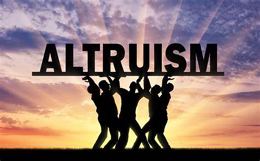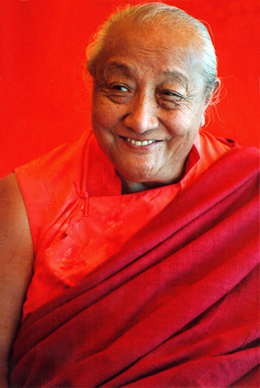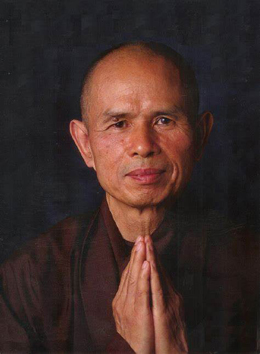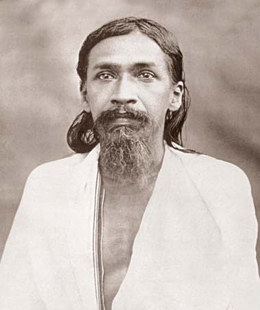Consciousness and health
Altruism in Various Lights
Abstract
This study explores altruism, selflessness and rejoicing in the happiness of others, a state which also helps dissolve the idea of jealousy and divisiveness. Truth is One, and there are infinite possibilities of approaching it. We explore these ideas in the light of Buddhism, in the light of Zen and in the light of Sri Aurobindo, providing a resolution to all who struggle with the large gulf between knowing these truths and embodying them.
Buddhist reflections
Lord Atisha’s verses on mind training - verse 3 — “The Supreme great quality is altruism (1).”
The idea of altruism has been a debatable one. It can be a slippery slope. When looking from far-off, it seems that one’s sense of self can become attached to giving or selflessness and become a greater trouble. Let us explore altruism in the light of Buddhist teachings, in the light of Zen master, Thich Naht Hahn and in the light of Sri Aurobindo.
If we study Buddhist teachings we come across verses such as this one by Shantideva (8th Century CE, philosopher, Indian Buddhist monk, poet and scholar):
“Whoever wishes quickly to become
A refuge for himself and others,
Should undertake this sacred mystery,
To take place of others, giving them his own (2)”.
We come across teachings which talk about considering others as more precious than oneself, because each being has been our mother in previous lives, and as a mother she did so much for the children, never caring much about her own self, giving herself to her children, and so I must have endless gratitude for each sentient being.
Quoting Dilgo Khyentse from Enlightened Courage:
“We attach great importance to what we conceive of as myself, and therefore, to such thoughts, as my body, my mind, my father, my mother. But the capacity of ‘others’ we neglect and ignore. We may be generous to beggars and give food to those who need it, but it is a fact that we do not care for them as much as we care for ourselves…. Just as we are able to ignore others, we should be able to ignore ourselves. This is how a Bodhichitta (enlightened heart/mind) begins to grow (3).”
One often wonders, when one is suffering or unhappy oneself, how can one possibly think of carrying or taking other people’s suffering onto oneself? Or how can I rejoice in someone’s success when I am myself not materially successful? The more we believe in ourselves being a limited separate self, separate from the person who may be happy at this moment, the more miserable we become. Why? Because that’s not who we truly are! We are believing in falsehood and leaving the side of Truth. In truth, we are all one, all of us are movements of the One, the Divine.
So, in rejoicing in the happiness of others, I am giving my true Self a chance to become more concrete, real, and giving the sense of separate self a back seat, ignoring it, ignoring the falsehood of the ego-consciousness. In truth, since all movements are movements of the one Divine, hence seemingly separate individual things are interconnected at many levels; therefore if I hurt others, I hurt myself.
The idea of Inter-being
The great Vietnamese Zen master, Thich Naht Hanh, introduces a new idea — ‘Inter-being’:
“If you are a poet, you will see clearly that there is a cloud floating in this sheet of paper. Without a cloud, there will be no rain, without rain, the trees cannot grow, and without trees, we cannot make paper.
So we can say that the cloud and the paper, inter-are. ‘Inter-being’ is a word that is not in the dictionary yet, but if we combine the prefix ‘inter’ with the verb ‘to be’ we have a new verb, ‘Inter-be.’ Without a cloud, we cannot have paper, so we can say that the cloud and the sheet of paper ‘inter-are.’
…..Looking even more deeply, we can see we are in it too. This is not difficult to see, because when we look at a sheet of paper, the sheet of paper is a part of our perception. Your mind is in here and mine also. So, we can say that everything is in here with this sheet of paper. You cannot point out one thing that is not here — time, space, the earth, rain, the minerals in the soil, the sunshine, the cloud, the river, the heat; everything co-exists with this sheet of paper (4).”
This idea of inter-being has great practical implications. If I see this interconnectedness, then would I still be able to hurt others? Would I still be able to exploit earth and its elements? Would I still be able to be cold and indifferent to things happening all around? If we do explore this idea, we see that others’ pain is my pain, their success is my success and their growth is my growth. Then I will be able to work self-lessly, and I will be able to offer myself more and more for the Divine works, and hence also embark on the path of surrender and complete self-giving. Then the sense of sacrificing myself for the sake of others is also taken care of.
Why? Because, since in essence there are no others, it is all an expansion of my own Self, so who is sacrificing for whom? I am working for my own Self only. And hence there is also no demand or expectation in return. Life can become a disinterested, self-giving, self-offering, to One and the only Self. When I work for the true benefit of others, I am just working for the one Self, whose extension is all of this existence. And in that work, I benefit myself and others, all inclusively.
The synthesis by Sri Aurobindo
Coming to and concluding with Sri Aurobindo here, on true altruism; we go to his commentary on the Issa Upanissad, which also elaborates and clarifies on why we can rejoice in others’ happiness, instead of being jealous.
If someone has success, wealth, health and material possessions or even some attainments, instead of following the dictates of jealousy and feeling inferior, one can also take the stance of rejoicing in their success, attainment and happiness. And when, instead of feeling low or jealous, I rejoice in their joy, what I am actually doing is — I am identifying with my true Self, which is the same in all. I say, I am the one rejoicing through the body of the other. And instead of feeling why I don’t have that success or attainment, I can feel, I have the success or attainment through him. Since in essence, he and I are one Self.
The philosophical justification of altruism
“…., I am He; Thou too art He; there is therefore no I and Thou, but only He. Brahman, Isha is my true self, the real Devadatta; Brahman, Isha is the true self of my neighbour, the real Harishchandra. There is therefore really no Devadatta, no Harishchandra, but my Self in the mental and bodily case called Devadatta and my Self in the mental and bodily case called Harishchandra. If therefore Harishchandra enjoys the untold riches, it is I who am enjoying them; for Harishchandra is my Self — not my body in which I am imprisoned or my desires by which my body is made miserable, but my true Self, the Purusha or real Man within me, who is the witness and enjoyer of all this sweet, bitter, tender, grand, beautiful, terrible, pleasant, horrible and wholly wonderful and enjoyable drama of the world which Prakriti enacts for his delectation.
Once I experience this truth, I can take as much pleasure in the riches of Harishchandra, as if I myself were enjoying them; for I can thenceforth go out of my own self and so enter into the self of Harishchandra, that his pleasure becomes my own.
To do that I have to simply break down the illusory barrier of associations which confines my sense of self to my own body, mind and vitality. That this can be done, is a common experience of humanity, to which the name of love is given. Human evolution rises through love and towards love.
….The Vedanta provides in the realisation of a single Self and the illusory character of all division the only real explanation of this higher or spiritual love. Altruism in the light of this one profound revealing truth becomes natural, right and inevitable. It is natural because I am not really preferring another to myself, but my wider truer Self to my narrower false self, God who is in all to my single mind and body, myself in Devadatta and Harishchandra, to myself in Devadatta alone.
It is right because by embracing in my range of feelings the enjoyment of Harishchandra in addition to my own, I shall make my knowledge of the universality of Brahman an experience, and not merely an intellectual conception or assent;
……It is inevitable because that is my way of evolution. As I have risen from animal to the man, so must I rise from the man to the God, but the basis of godhead is the realisation of oneself in all things (5).”
Practical implications
For those of us who don’t experiment with these truths, of course it is all theory and intellectual concept. One has to live it in order to know it. For example, the next time when any sense of a separate self, being a limited confined personality rises up, or one compares oneself with some other person, look how successful he/she is, what kind of knowledge and wisdom he/she has but I don’t have…. then, instead of shrinking back in this thought — I don’t have, I am inferior — which makes me weaker and full of depleton, I can actually consciously rejoice in their happiness/success. I can tell myself: how happy they must be to have their wishes fulfilled. How nice! May everyone have this joy and happiness. I can, in that moment, know deeply that it is the Divine in the other body rejoicing through the success. And since in essence I am that Divine, it is me who is rejoicing in that success.
Gradually, this process of being conscious of the sense of limited/separate self, and not following its dictates can help me cultivate a new path, the Sunlit Path, one of collaboration towards further and further unification with the divine Consciousness, which is that which only is; and therefore liberate me from the clutches of the ego-consciousness. And hence it can help fulfil our true purpose of being human – a continuing union with the Divine consciousness.
References
1. [Online] https://www.yogaanytime.com/attach/2018/12/18/Training_the_Mind_with_ Jetsumna_Tenzin_Palmo.pdf [Accessed 2nd August 2022].
2. Shantideva. The way of the Bodhisattva: A translation of the Bodhicaryaavataara. Massachusetts: Shambhala Classics; 1999.
3. Khyentse D. Enlightened Courage. Dordogne, France: Editions Padmakara; 1992, p. 28.
4. Thich Naht Hanh. The Heart of Understanding. Berkeley CA: Parallax Press; 1988.
5. Sri Aurobindo. The Complete Works of Sri Aurobindo, Volume 17. Pondicherry: Sri Aurobindo Ashram Trust; 2003, p.106.
Dr. Monica Gulati, a learner and a seeker, is based in Gurgaon, India and an editor of NAMAH.
Share with us (Comments,contributions,opinions)
When reproducing this feature, please credit NAMAH,and give the byline. Please send us cuttings.





